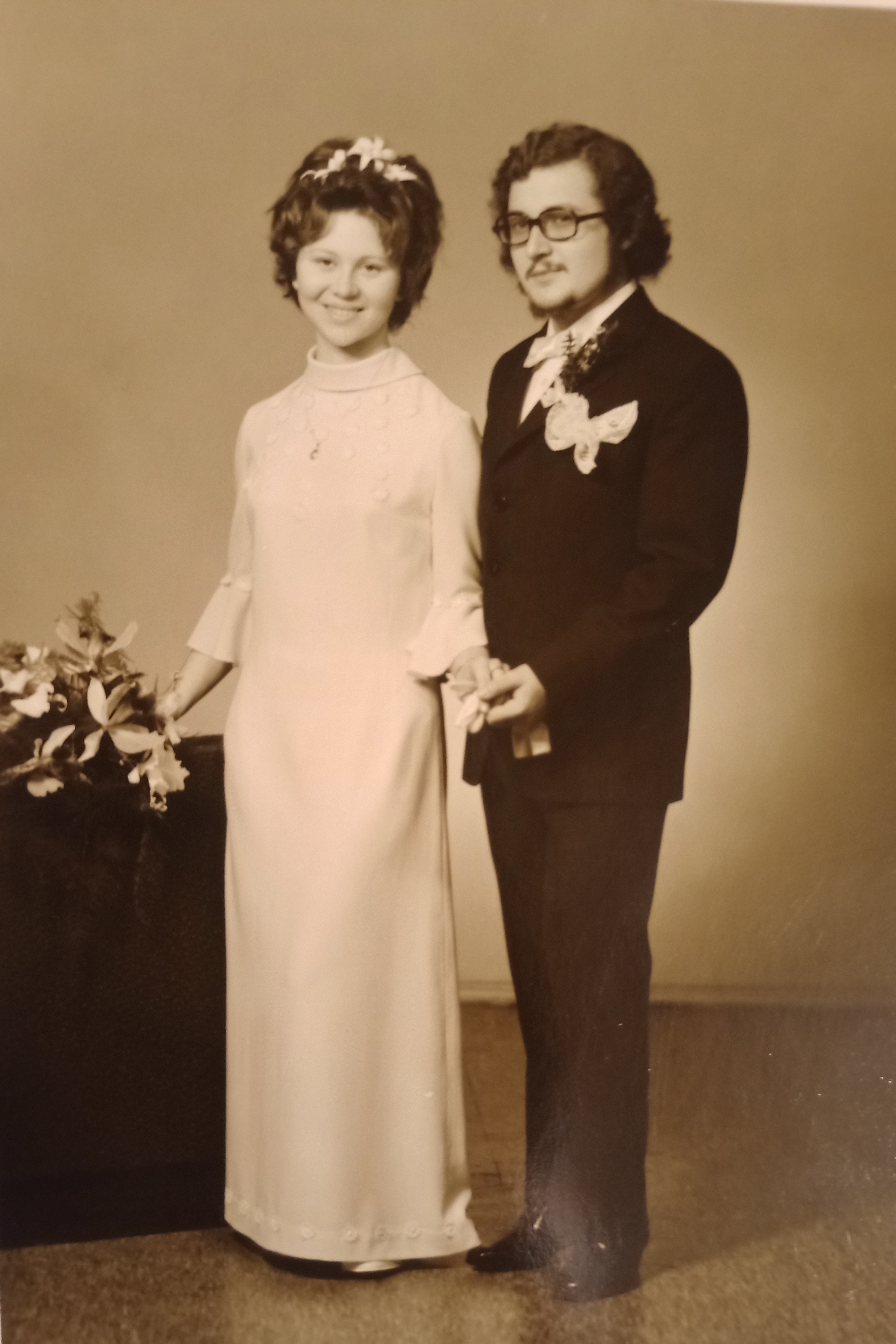"It was so weird, it was weird days. In the evening you didn't go out much, as it got dark, there was almost martial law, nobody wanted to go out, but we went for a walk around the square. It was nice, Sunday, so we walked around the square. As we walked around the square - after the 'prom' it wasn't much of a walk either, so we walked through the middle of the skittle alley, and the tanks and cars started coming, rumbling, and the tanks kept coming. We stayed in the middle on the skittle alley, as they say, where Masaryk is standing, and we just crossed over to the other side where Dési is. (There's a shop next to Dési now, a newly made bookstore). We only crossed there, we were standing by that shop and we wanted to get to ASU, that we were just crossing the road and going home, so we wouldn't be among those tanks. No way, it was scattered with tanks. The tank stayed standing in front of the town hall. Of course, in those few days there was a black flag, our flag half-hang, on the skittle alley it said 'Ivan go home!' and Moscow - so many and so many kilometers to go back. There were angry banners everywhere. As they stayed standing, they started to illuminate the town hall, and I didn't think... My mother was standing there, we met a lady from our house with a Mrs. Khmelar, me and my mother, Mr. Ostadal, three other people, an old man, a young lady... There were six or seven of us. We were standing by the shop window, it's protruding outside, but when you go in, into the shop, the entrance is set into an alley, it's there all the time, I think. I stood and watched what they were doing, and they were singing! I said, "They're drunk or something... They were just lighting up everywhere, and all of a sudden...I was standing by the candelabra, the street light, all of a sudden they started going all over the ground, like you have sizzling balls, and I was looking for it, I said, What is that? The light started like falling. I didn't hear the first moment because the tanks were roaring, and I just know how the balls were flying, how something was falling there. That my mother took me and dragged me by the head to the door and just shouted at me, 'Let them kill me, but don't let them kill you!' And they started shooting sharp. There was a group of people, Mr. Oštádal - he lived across the road in Žižkov (square), he was a tailor - he leaned against the door, just broke or smashed the glass and just shouted: 'Run back, don't stand behind the window, run back!' The shop is long, there was a sort of 'U shape' and it used to be a book bindery at the back. It was called the KNIHDRUP, there was a book reception at the front and a workshop at the back where the books were mended. We went into that workshop, hid around the corner and that's when they started firing sharp, it was flying like thunder. How long it lasted I don't know, I just remember that the old man was praying there, I felt sorry for him. One gentleman there put on - we all used to have it - a radio over the wire, it was a kind of radio where there was one local wave. He kept playing it and he wanted to know what was going on, that somebody was going to report it. The young lady kept crying that she had a husband in the army, it was terrible. At that moment we were in the dark, it smelled, there was shooting, it was flying everywhere. We were hiding there. I didn't do anything, I don't think, my mother was crying all the time and holding me not to go anywhere. So we survived the shooting, we came out, but it was terrible... Outside, the smell, the horror, the screaming everywhere... As the KNIHDRUP, then there's a bank, a jewelry store, next door there's another store and this green door and behind it was the first victim. A young girl, she was standing behind the door, so she was shot, a gentleman, like the bank on Žižkov Square - now actually a savings bank - so opposite, it was an old communist. They shot him, and at the National Theatre they shot this friend, a friend of mine, Boháč. Others were wounded. That moment, before we went up to the corner around Desi to go home, a bus had already come to collect the wounded. The siren started, the town hall began to announce that we should all leave the square immediately, that another column of Russians was coming through Bučovice, where they were also shooting sharp. That they were shooting again, and if we had the chance, we shouldn't be in the square or at the windows. As they were shooting on Žižkov Square, when they were driving, they were driving around and around, unfortunately, because our grandfather was in a group that, when those rascals were driving in tanks, when they came, they would turn their signposts."










